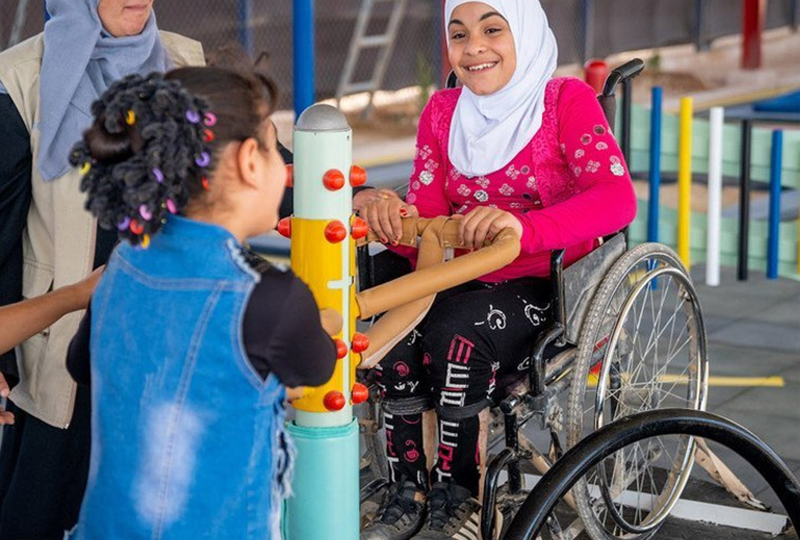 Guterres
Guterres
Progress on disability rights risks going in reverse: Guterres
A “cascade of crises” is putting global progress towards ensuring the rights of persons with disabilities in danger, UN Secretary-General António Guterres warned on Tuesday in New York.
Addressing a conference to take stock of action since the adoption of the Convention on the Rights of Persons with Disabilities (CRPD) 17 years ago, he urged countries to “do much, much better” to achieve greater inclusion and accessibility.
Tweet URL
There are more than one billion persons with disabilities worldwide, most of whom are of working age and live in developing countries.
‘A landmark moment’
The 16th session of the Conference of States Parties to the CRPD is taking place at UN Headquarters through Thursday.
Mr. Guterres said the treaty marked “a landmark moment in our shared journey towards a more just and inclusive future for all.”
It has been ratified by 186 countries, and some 75 per cent of State Parties have passed laws to guarantee the integration of students with disabilities in mainstream schools.
Nearly 80 per cent now prohibit discrimination in hiring against persons with disabilities, and over 90 per cent have adopted national disability laws.
Hit hard by crises
“Today, however, the progress we achieved is at risk of reversing,” he said, referring to the lingering effects of the COVID-19 pandemic, the worsening climate emergency, conflicts, soaring humanitarian needs, and the global cost-of-living crisis.
Mr. Guterres noted that persons with disabilities “are often hit first and worst” when crisis strikes. “In every emergency – from natural disasters to pandemics to armed conflicts – persons with disabilities lose their lives at vastly higher rates,” he said.
Furthermore, workers with disabilities – who already suffer exclusion and marginalization – are often the first to lose their jobs and the last to be re-hired. Meanwhile, women and girls with disabilities are more likely to suffer violence and abuse, face discrimination, and remain trapped in poverty.
Everyone wins
“We must do much, much better,” he said, underlining that everyone has the right to live lives of dignity and opportunity, in societies that are peaceful, prosperous, and just.
“Because a world in which persons with disabilities can realize their full potential is a world that is more equal, more inclusive, more vibrant, fairer and better for all,” he added.
Areas for action
Mr. Guterres said the conference highlights three areas where progress must be made now, starting with improving digital accessibility for persons with disabilities, as “leaving no one behind, means leaving no one offline.”
Persons with disabilities must also have equal access to sexual and reproductive health services, an issue that has been “so deeply neglected”, he continued.
“It is not only a matter of justice and rights, including fundamental reproductive rights – for women with disabilities, access to sexual and reproductive health services can be the difference between life and death,” he said.
Finally, countries must ensure the full inclusion and active participation of persons with disabilities in all their diversity.
“Specifically, that means shifting mindsets to ensure persons with disabilities are fully included in decision-making processes on all issues that affect them,” he said. “And it means realizing the powerful call of the disability movement: ‘Nothing about us, without us.’”
Pick up the pace
The Secretary-General underlined the UN’s commitment to take ownership and show leadership.
Four years ago, he launched a strategy on disability inclusion across all pillars of the Organization’s work in peace and security, human rights, and development. Since then, UN entities and country teams have met 30 per cent of benchmarks.
Mr. Guterres acknowledged that “while this is progress – it is neither fast nor broad enough”, adding “we must pick up the pace.”
“My commitment is ironclad: guided by persons with disabilities and their representative organizations, we will not stop until disability inclusion and accessibility are fully built into every aspect of our work – across every policy, programme, and operation; from headquarters to the field,” he said.
Accurate data is critical
The President of the UN General Assembly, Csaba Kőrösi, noted that there is still much to do to translate the CRPD’s landmark provisions into real change on the ground.
He highlighted the crucial need for accurate data which will help policy makers with allocating resources to support persons with disabilities.
“These efforts will be particularly important for overcoming the barriers to digital inclusion. Persons with disabilities often have lower incomes than others, making the cost of adaptive technology or connectivity services a burden,” he said.
Justice for all
Mr. Kőrösi also voiced his commitment to building more just and inclusive societies.
He said the General Assembly held a meeting on Tuesday on the role of “easy-to-understand communication”, helping people with disabilities to engage fully in UN life, he added.
On Thursday, the Assembly will hold a High-Level Meeting on ‘Equal Access to Justice for All’, he added.
Among the speakers is an activist who is helping other persons with disabilities to navigate the complexities of legal systems around the world.
Support Our Journalism
We cannot do without you.. your contribution supports unbiased journalism
IBNS is not driven by any ism- not wokeism, not racism, not skewed secularism, not hyper right-wing or left liberal ideals, nor by any hardline religious beliefs or hyper nationalism. We want to serve you good old objective news, as they are. We do not judge or preach. We let people decide for themselves. We only try to present factual and well-sourced news.







